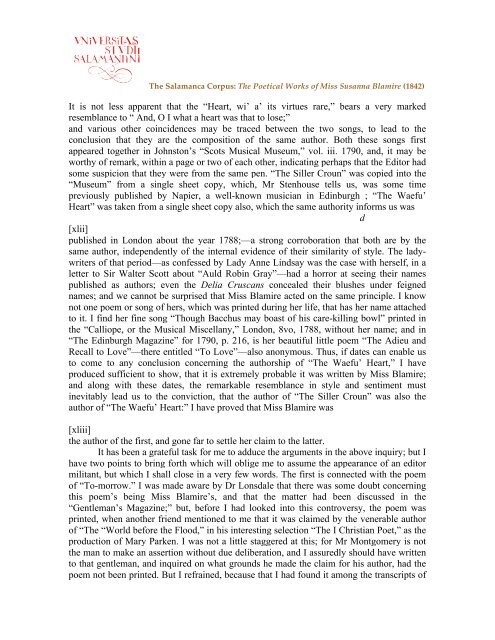The Poetical Works of Miss Susanna Blamire (1842) - Gredos ...
The Poetical Works of Miss Susanna Blamire (1842) - Gredos ...
The Poetical Works of Miss Susanna Blamire (1842) - Gredos ...
You also want an ePaper? Increase the reach of your titles
YUMPU automatically turns print PDFs into web optimized ePapers that Google loves.
<strong>The</strong> Salamanca Corpus: <strong>The</strong> <strong>Poetical</strong> <strong>Works</strong> <strong>of</strong> <strong>Miss</strong> <strong>Susanna</strong> <strong>Blamire</strong> (<strong>1842</strong>)<br />
It is not less apparent that the “Heart, wi’ a’ its virtues rare,” bears a very marked<br />
resemblance to “ And, O I what a heart was that to lose;”<br />
and various other coincidences may be traced between the two songs, to lead to the<br />
conclusion that they are the composition <strong>of</strong> the same author. Both these songs first<br />
appeared together in Johnston’s “Scots Musical Museum,” vol. iii. 1790, and, it may be<br />
worthy <strong>of</strong> remark, within a page or two <strong>of</strong> each other, indicating perhaps that the Editor had<br />
some suspicion that they were from the same pen. “<strong>The</strong> Siller Croun” was copied into the<br />
“Museum” from a single sheet copy, which, Mr Stenhouse tells us, was some time<br />
previously published by Napier, a well-known musician in Edinburgh ; “<strong>The</strong> Waefu’<br />
Heart” was taken from a single sheet copy also, which the same authority informs us was<br />
d<br />
[xlii]<br />
published in London about the year 1788;—a strong corroboration that both are by the<br />
same author, independently <strong>of</strong> the internal evidence <strong>of</strong> their similarity <strong>of</strong> style. <strong>The</strong> ladywriters<br />
<strong>of</strong> that period—as confessed by Lady Anne Lindsay was the case with herself, in a<br />
letter to Sir Walter Scott about “Auld Robin Gray”—had a horror at seeing their names<br />
published as authors; even the Delia Cruscans concealed their blushes under feigned<br />
names; and we cannot be surprised that <strong>Miss</strong> <strong>Blamire</strong> acted on the same principle. I know<br />
not one poem or song <strong>of</strong> hers, which was printed during her life, that has her name attached<br />
to it. I find her fine song “Though Bacchus may boast <strong>of</strong> his care-killing bowl” printed in<br />
the “Calliope, or the Musical Miscellany,” London, 8vo, 1788, without her name; and in<br />
“<strong>The</strong> Edinburgh Magazine” for 1790, p. 216, is her beautiful little poem “<strong>The</strong> Adieu and<br />
Recall to Love”—there entitled “To Love”—also anonymous. Thus, if dates can enable us<br />
to come to any conclusion concerning the authorship <strong>of</strong> “<strong>The</strong> Waefu’ Heart,” I have<br />
produced sufficient to show, that it is extremely probable it was written by <strong>Miss</strong> <strong>Blamire</strong>;<br />
and along with these dates, the remarkable resemblance in style and sentiment must<br />
inevitably lead us to the conviction, that the author <strong>of</strong> “<strong>The</strong> Siller Croun” was also the<br />
author <strong>of</strong> “<strong>The</strong> Waefu’ Heart:” I have proved that <strong>Miss</strong> <strong>Blamire</strong> was<br />
[xliii]<br />
the author <strong>of</strong> the first, and gone far to settle her claim to the latter.<br />
It has been a grateful task for me to adduce the arguments in the above inquiry; but I<br />
have two points to bring forth which will oblige me to assume the appearance <strong>of</strong> an editor<br />
militant, but which I shall close in a very few words. <strong>The</strong> first is connected with the poem<br />
<strong>of</strong> “To-morrow.” I was made aware by Dr Lonsdale that there was some doubt concerning<br />
this poem’s being <strong>Miss</strong> <strong>Blamire</strong>’s, and that the matter had been discussed in the<br />
“Gentleman’s Magazine;” but, before I had looked into this controversy, the poem was<br />
printed, when another friend mentioned to me that it was claimed by the venerable author<br />
<strong>of</strong> “<strong>The</strong> “World before the Flood,” in his interesting selection “<strong>The</strong> I Christian Poet,” as the<br />
production <strong>of</strong> Mary Parken. I was not a little staggered at this; for Mr Montgomery is not<br />
the man to make an assertion without due deliberation, and I assuredly should have written<br />
to that gentleman, and inquired on what grounds he made the claim for his author, had the<br />
poem not been printed. But I refrained, because that I had found it among the transcripts <strong>of</strong>
















